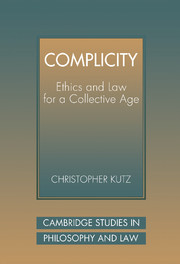Book contents
- Frontmatter
- Contents
- Acknowledgments
- 1 Introduction
- 2 The Deep Structure of Individual Accountability
- 3 Acting Together
- 4 Moral Accountability and Collective Action
- 5 Complicitous Accountability
- 6 Problematic Accountability: Facilitation, Unstructured Collective Harm, and Organizational Dysfunction
- 7 Complicity, Conspiracy, and Shareholder Liability
- 8 Conclusion: Accountability and the Possibility of Community
- Notes
- Bibliography
- Index
6 - Problematic Accountability: Facilitation, Unstructured Collective Harm, and Organizational Dysfunction
Published online by Cambridge University Press: 18 March 2010
- Frontmatter
- Contents
- Acknowledgments
- 1 Introduction
- 2 The Deep Structure of Individual Accountability
- 3 Acting Together
- 4 Moral Accountability and Collective Action
- 5 Complicitous Accountability
- 6 Problematic Accountability: Facilitation, Unstructured Collective Harm, and Organizational Dysfunction
- 7 Complicity, Conspiracy, and Shareholder Liability
- 8 Conclusion: Accountability and the Possibility of Community
- Notes
- Bibliography
- Index
Summary
INTRODUCTION
The last two chapters examined the moral accountability of individuals for the actions and consequences of the collective acts in which they participate. Because participatory accountability is based primarily on individual intentions rather than causal contributions, the individuals I considered, such as the Dresden bombers, were accountable even when their actions made no difference to the resulting harm. Interpreting complicity in terms of participation makes sense of a great variety of contexts, whenever individuals are linked together in a common pursuit, from conspiracy to contract to employment. This understanding of complicity makes considerable headway on the practical problem I posed in Chapter 1: the problem of how to provide individuals with reasons to avoid and repair the collective harms that mar our social landscape. Many of these harms arise from the concerted acts of governments, companies, and cartels. Individual participants in these organizations are accountable for the collective harms that arise, and so have individual moral reason to atone for the past and try better for the future.
At the same time, many of the most serious collective harms are not obviously the products of concerted action. They are, rather, the results of a confluence of individual behavior. Environmental damages that result from an aggregate of marginal individual contributions are the chief example of this genre, which I will call unstructured collective harms. As with the Dresden bombers, no individual polluter's contribution makes a significant causal difference. However, unlike the Dresden bombers, individual polluters are not intentional participants in a collective act of pollution. So the usual basis for applying the Complicity Principle does not obtain.
Information
- Type
- Chapter
- Information
- ComplicityEthics and Law for a Collective Age, pp. 166 - 203Publisher: Cambridge University PressPrint publication year: 2000
